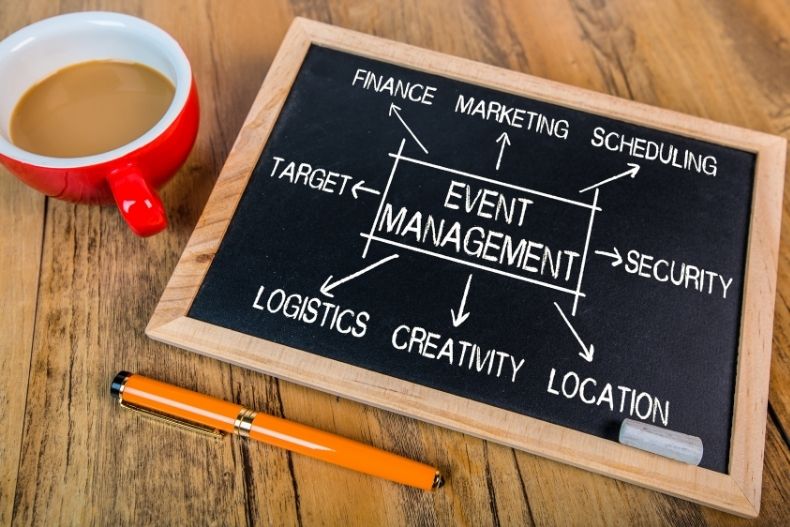The event planning business is not for everyone. It requires incredible commitment and attention to detail, as well as exceptional abilities to perform under pressure and multitask. However, if you think that you are up for the challenge, it can also be a highly lucrative business opportunity.
Of course, to run a profitable company, you will need a bit more than niche-specific skills, knowledge how to manage your employees, discover attractive business opportunities, and know how to fax from computer, but with a good plan, there is no reason why you should not succeed. No matter your business type, you have to start by developing a solid business plan, researching the market, and defining your business goals, mission, and scope of work.
Then, you will have to focus on creating a suitable marketing strategy and improving your tech-savviness, as planning events without modern tools, like event management software and scheduling or planning apps, is simply inefficient. Last but not least, never cease investing in company growth and self-development.
Join us as we go through more details below!

Develop a Business Plan
Any business plan is a roadmap that you, as a business owner, should follow. It helps you set your goals and objectives, assess the market’s potential, and create a viable strategy for long-term success.
For your event planning business, the plan must follow a certain structure. At a minimum, it should include the following sections:
- executive summary – a quick overview of your business and its goals,
- market analysis – assessment of the market size and potential,
- competitive analysis – the strengths and weaknesses of your competitors, and your company’s competitive strategy, including your company’s strengths, weaknesses, opportunities, and potential threats that it will have to face.
- company description – a brief description of your business, including its history, background, core business activities, and future objectives, more detailed information about your business – your mission statement, vision, values, goals, etc.
- products and services – the goods and services you intend to provide to your customers.
- marketing plan – the outline of your marketing plan, strategies for reaching out to potential customers, as well as plans for increasing brand awareness.
- management plan – the description of how you plan to manage your business, a staffing chart and an organizational chart, the management team, and their responsibilities.
- financial plan – projected revenue and expense statements for one year, a budget for the first twelve months of operation.
Once you are done with the plan, do read it thoroughly, edit it multiple times, and get feedback from other people. The more you perfect it, the better prepared you will be for launching your event planning business.
Research the Market
As mentioned above, you will have to assess the market size and potential, as well as analyze your competitors and provide a competitive analysis. With that in mind, you need to do market research – define your target audience, learn about their needs and expectations, understand the industry trends, and identify opportunities for growth. To do that, you need to conduct a number of different activities, such as competitive analysis, industry research, SWOT analysis, and customer surveys.
There are several ways to gather data – from the most sophisticated and expensive to simple and inexpensive. You can work with a professional research company, or use your own resources – interviews and questionnaires, for example. In the end, you will want to analyze the gathered information and translate it into a comprehensive report.
Define Your Goals, Mission, and Scope of Work
You will also have to define your business goals. In most cases, it boils down to determining who your customers are, what you want to achieve and how, and setting sales goals.
You should also take the time to think about your company’s mission statement – what are your business goals and objectives? What do you want your customers to say about you? How do you want to differentiate yourself from the competition?
Lastly, it is just as important to define your scope of work and understand how you plan to execute it. For instance, if you are planning a wedding, your scope of work and responsibilities are far more extensive than planning an anniversary party.
Create a Marketing Strategy
Once you have a solid business plan, it is time to focus on marketing. Your strategy should include all the activities that will help you establish and maintain your brand image, build relationships with your customers, attract and retain new clients, and increase revenue.
You will want to consider all the available options, from traditional marketing strategies, like advertising and public relations, to newer approaches, such as content marketing, search engine optimization, and social media marketing. Take into account your target audience and decide on the most effective channels for reaching out to them. Finally, create a marketing calendar with all the activities that you will pursue.
As with your business plan, make sure your marketing strategy is comprehensive, clear, and detailed. You will need it to measure your success, track your progress, and adjust your strategy based on real-time data.
Tech-Savviness Is Required
Event planning businesses are quite demanding when it comes to tech-savviness. After all, if you want to create an online presence and interact with your customers via social media, you will need some technical knowledge. But that is not the only thing that requires digital skills.
For example, event planning software is a must-have for any professional event planner. It will help you keep track of your business, manage logistics and plan events while saving time and money. A good event management app will also help you with creating floor plans and seating charts, managing attendees’ RSVPs, etc.
In addition to that, you will need to invest in other tech tools, like marketing automation software, scheduling apps, or attendance tracking tools.
Keep Growing and Learning
Last but not least, you need to keep growing your business. To do that, you will have to follow the latest industry trends and keep improving your skills and knowledge.
When it comes to the latter, you can choose from any number of courses, workshops, or seminars that are designed to help small business owners learn how to manage their organizations more efficiently by cutting costs and increasing revenue. You can also take a few online courses to earn a certificate or a diploma in event planning.
As for the former, there is hardly a better way to stay up-to-date than reading industry magazines, blogs written by experts and industry leaders, and taking part in industry events. You should also get involved in networking with other professionals by attending industry conferences and events and participating in relevant social media groups.
The Bottom Line
If you plan to start your own event planning company, it is important to create a business plan that will help you attract customers as well as support your company’s growth. To do that, conduct market research, analyze your competitors, define your target audience, and create a marketing strategy. Remember that tech-savviness is also an important requirement for event planners. Other than that, you have to keep growing and learning.
As you can see, event planning is a complex business that requires you to know the industry well and have a good strategy in place. But if you are willing to work hard and grow your business, it is definitely worth considering.











